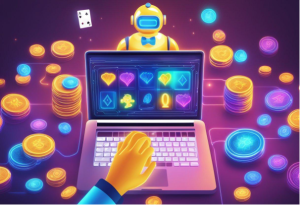Online slot gacor has evolved into a multi-billion-dollar industry, captivating millions of players around the world. From its humble beginnings to its current status as a major cultural and economic force, online gaming has undergone significant transformations. This article explores the history, technological advancements, social impact, economic significance, and future trends of online gaming.
A Brief History of Online Gaming
The origins of online gaming can be traced back to the 1970s with the creation of text-based games like MUDs (Multi-User Dungeons). These early games allowed multiple players to interact in a shared virtual environment, laying the groundwork for the multiplayer experiences we enjoy today. The 1990s saw the emergence of graphical online games such as “Diablo” and “Ultima Online,” which offered more immersive experiences. The early 2000s brought the rise of MMORPGs (Massively Multiplayer Online Role-Playing Games) like “World of Warcraft,” which attracted millions of players and set new standards for online gaming.
Technological Advancements
The rapid advancement of technology has played a crucial role in the evolution of online gaming. High-speed internet connections have enabled seamless multiplayer experiences, while powerful gaming consoles and PCs have brought high-definition graphics and complex gameplay mechanics. The advent of cloud gaming services like Google Stadia and Microsoft xCloud has further democratized access to high-quality gaming, allowing players to stream games on various devices without the need for high-end hardware.
The Social Impact of Online Gaming
Online gaming has a profound social dimension, fostering communities where players can collaborate, compete, and form meaningful relationships. Games like “Fortnite,” “Minecraft,” and “Among Us” provide platforms for social interaction that often extend beyond the virtual world. Voice chat, forums, and social media integrations enhance these connections, making gaming a communal activity. During times of global isolation, online gaming has proven to be a vital tool for maintaining social connections and combating loneliness.
Economic Significance
The economic impact of the online mahjong ways 2 industry is substantial, with revenues reaching billions of dollars annually. This revenue is generated through game sales, in-game purchases, subscriptions, and advertising. Microtransactions, where players buy virtual goods, have become a significant revenue stream. The rise of esports has further contributed to the economy, attracting sponsorships, media rights deals, and large audiences. Major tournaments offer substantial prize pools, professionalizing the gaming landscape and creating new career opportunities.
The Rise of Esports
Esports has transformed online gaming into a global competitive phenomenon. Games like “League of Legends,” “Counter-Strike: Global Offensive,” and “Dota 2” host international tournaments with viewership numbers rivaling traditional sports. Professional esports athletes, teams, and organizations have emerged, supported by sponsorships and media coverage. Streaming platforms such as Twitch and YouTube Gaming play a crucial role in broadcasting these events, creating a vibrant community of fans and spectators.
Streaming and Content Creation
Streaming platforms have revolutionized the way games are consumed and enjoyed. Gamers can broadcast their gameplay live, interact with viewers, and build dedicated fanbases. Content creators on platforms like Twitch and YouTube Gaming have become influential figures in the gaming community, shaping trends and culture. The ability to monetize streams through subscriptions, donations, and sponsorships has created new career opportunities and contributed to the growth of the gaming ecosystem.
Diversity in Game Genres
The online gaming landscape is characterized by a diverse array of genres catering to various tastes and preferences. From fast-paced shooters like “Call of Duty” to expansive role-playing games like “The Elder Scrolls Online,” there is something for every player. Battle royale games like “PUBG” and “Apex Legends” have gained immense popularity, while sandbox games like “Roblox” and “Minecraft” offer creative freedom. This diversity ensures that the gaming ecosystem remains vibrant and continuously evolving.
Virtual Reality and Augmented Reality
Virtual reality (VR) and augmented reality (AR) are at the forefront of gaming innovation, offering immersive and interactive experiences. VR headsets such as Oculus Rift and PlayStation VR transport players into fully realized virtual worlds, enhancing the sense of presence and interactivity. AR games like “Pokémon GO” blend digital elements with the real world, creating unique and engaging experiences. These technologies are poised to redefine the boundaries of gaming, offering new ways to interact with digital environments.
Educational and Therapeutic Applications
Online gaming is increasingly recognized for its educational and therapeutic potential. Educational games can enhance learning by making subjects more engaging and interactive. Gamified learning platforms are being integrated into educational curriculums, demonstrating the effectiveness of game-based learning. Additionally, therapeutic games are used to treat various conditions, including anxiety, depression, and cognitive impairments, highlighting the positive impact of gaming on mental health.
Challenges and Ethical Considerations
Despite its many benefits, online gaming faces several challenges and ethical concerns. Issues such as addiction, cyberbullying, and data privacy are prevalent. Game developers and platforms are working to address these challenges through better moderation, parental controls, and awareness campaigns. Ethical considerations include the impact of loot boxes and microtransactions on players, particularly younger audiences, prompting discussions about regulation and consumer protection.
The Future of Online Gaming
The future of online gaming is bright, with continued technological advancements and innovative trends on the horizon. Artificial intelligence (AI) will enable more responsive and adaptive game environments, enhancing the player experience. Blockchain technology and non-fungible tokens (NFTs) have the potential to revolutionize in-game economies and ownership, offering players true ownership of digital assets. Cloud gaming will continue to expand, making high-quality gaming experiences more accessible to a broader audience.
Conclusion
Online gaming has undergone a remarkable transformation, evolving into a multifaceted and influential industry. Its impact on entertainment, social connectivity, and the global economy is profound. As technology advances and new innovations emerge, online gaming will continue to captivate and connect players around the world, solidifying its place as a central pillar of modern culture and digital life.











